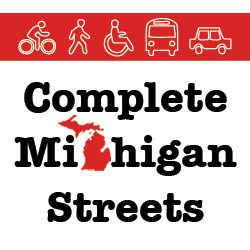 Yesterday the State Transportation Commission (STC),a six-member board that establishes policy and plans for Michigan’s transportation department, formally adopted a Complete Streets policy. The policy will direct Michigan Department of Transportation planners to keep all users in mind – including bicyclists, transit riders, motorists and pedestrians of all ages and abilities.
Yesterday the State Transportation Commission (STC),a six-member board that establishes policy and plans for Michigan’s transportation department, formally adopted a Complete Streets policy. The policy will direct Michigan Department of Transportation planners to keep all users in mind – including bicyclists, transit riders, motorists and pedestrians of all ages and abilities.
The STC invited public comment on the draft Complete Streets policy released at its June 28 meeting in Sault Ste. Marie. Many citizens and bicycle and pedestrian advocates across the state took advantage of the public comment period to request that the policy include stronger, clearer and more specific language with firm timelines for implementation. This included a petition drive led by the League of Michigan Bicyclists (LMB), which collected nearly 2500 signatures in a single week.
We thank the STC for being so responsive to the requests made by concerned citizens. Added and/or modified language strengthened the final policy providing more clarity in a number of areas as outlined below. A big thanks also goes out to all of the Michigan Complete Streets advocates who took the time to comment on the draft policy - your voices were heard!
Public Act 135 of 2010 requires the STC to enact a Complete Streets policy by August 2012. The STC has worked closely with the governor-appointed 18-member Complete Streets Advisory Council on the draft policy. The group’s role, according to law, is to advise the STC, county road commissions and municipalities on Complete Streets policies. Council members represent road and transit agencies, state agencies, walking and biking organizations, and environmental, senior citizens and disabled persons groups.
Below is a analysis of the final policy comparing it to the major revisions requested by the LMB petition.
- Strengthen implementation language.
- Identify the procedures or guidelines that will be developed or revised. – Did not include.
- Include a timeframe by which implementing documents will be developed or revised. – Included, by December 31, 2013.
- State a commitment to continue programs to educate and train MDOT personnel and other stakeholders on complete streets implementation. – Included language about training/education.
- Include language about implementation accountability. – Included language with a bit more specificity on what MDOT will report annually to the STC, but nothing about who will be responsible for developing/revising procedures, etc.
- State a commitment to continuing to base facilities design and construction on existing laws, best practices, and guidance documents. – Included language about this.
- Strengthen exception language.
- Refer to the exceptions already outlined in PA 135. – Not specifically referenced.
- Include a timeframe by which an exception procedure document will be developed. – Included, by December 31, 2013
- Include language about developing and using performance measures. – Included language about what MDOT will report annually to the STC, which stated “any information/examples to gauge MDOT’s performance.” (Not exactly what we was requested.)
- Strengthen language to direct MDOT to work with local road agencies (change “may” to “shall”). – Language was strengthened; “MDOT shall work with local road agencies that are undertaking road or bridge projects with federal funds…”
- Amend language about the network approach to expand “non-motorized” users to include all users, including people with disabilities and transit users. – Language states “all users”
- Specify whether there will be a sunset on annual reports to the State Transportation Commission. – Not specified.
Read the final policy below or download a PDF here.
















3 comments
Comments feed for this article
July 27, 2012 at 7:37 pm
State’s Top Transportation Board Responds to Michigan Voices | Our Voices
[…] The Michigan Complete Streets Coalition has a breakdown of some of the changes that were made to the policy. Check out their blog post to read more. […]
August 1, 2012 at 10:55 pm
darling darling
yeah…now we need to also, work on sr2s the safe routes to school. “sr2s”… thank you everyone…
August 15, 2012 at 8:11 pm
Vision for Complete Streets in Michigan « Michigan Complete Streets Coalition
[…] the State Transportation Commission officially adopted a Complete Streets policy on July 26th, 2012, as required by PA 134 and PA 135 of 2010, the Michigan Department of […]